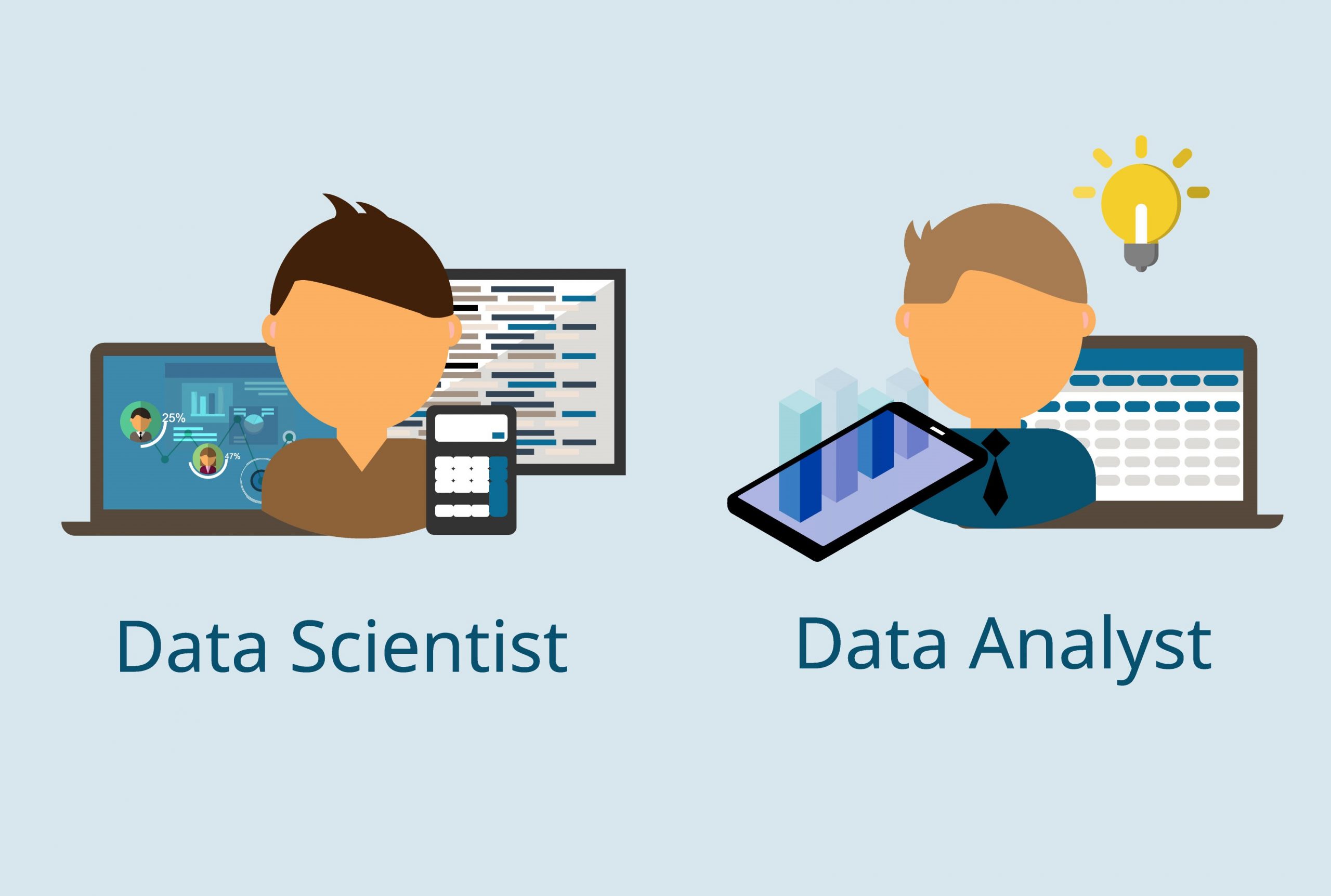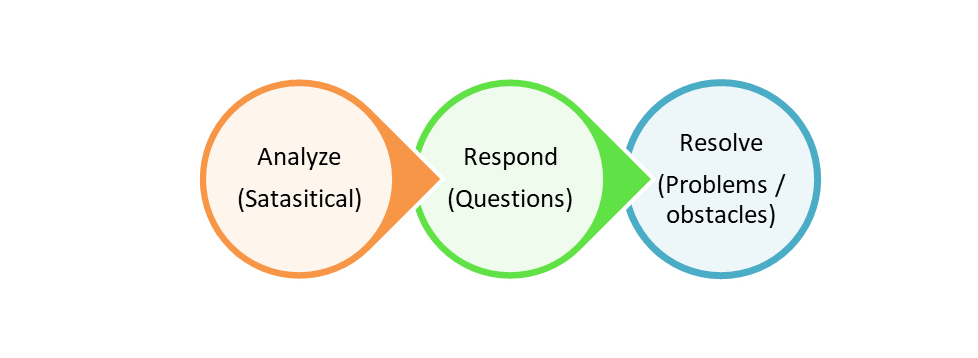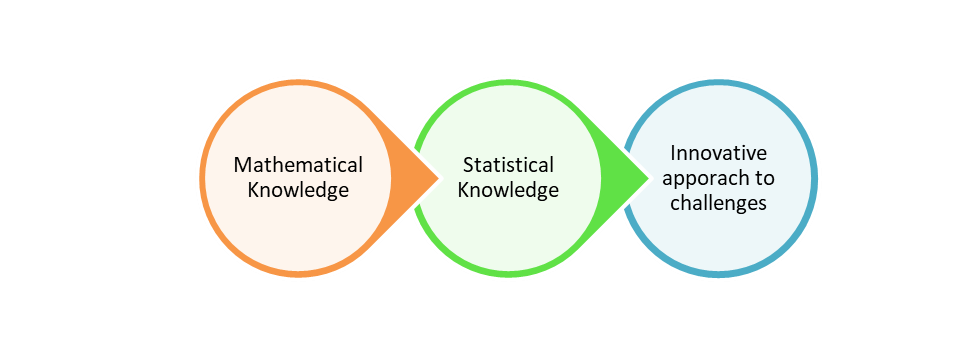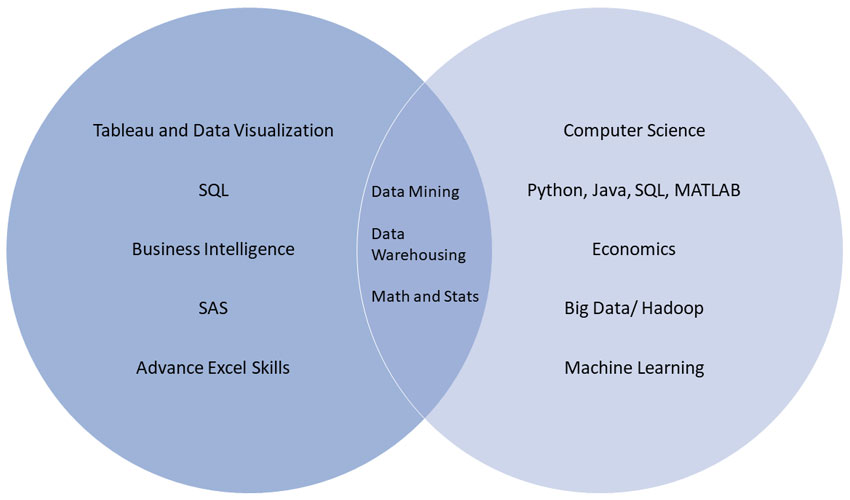Subscribe
Subscribe to EduBridge Blogs
The terms Analyst and Scientist tend to ring a bell in your mind. An analyst has been synonymous with finance and a Scientist has been synonymous with discovery or a person working in a lab. However, these terms are diversely used in the IT sector as well. There still looms a misconception that Data Analysts and Data Scientists have the same work profile. Through this blog, you can get clarity on which profile interests you more.
Recently professionals with skills related to data management have been given newfound love by employers. With the world getting increasingly dependent on digital mediums there is so much data to be filtered. Owing to this there has been a sudden spurt of multiple roles with varied profiles. But often people still get confused while applying for these positions. If you are more inquisitive to understand the difference between Data Analyst and Data Scientist then read on.

Who are Data Analysts?
Data Analysts are professionals with the expertise to analyze and extract important information from a pool of data that will help an organization to make important business decisions. They typically evaluate data on multiple parameters like trends, statistics, relevance, etc. A Data Analyst has three key roles.

An analyst delves deeper into the data, eliminates irrelevant information, and finds a solution to fix the missing data. The important tools used by Data Analysts include SQL, R, SAS, Power BI, and Tableau. Also, they must have good communication skills with which they can convey the right information.
Data Analyst Job Description
What does a data analyst do? Have you ever wondered? Well, the primary role of data analysts is to collect, process, analyze and interpret data to provide valuable insights that can drive informed decision-making within an organization. Your responsibilities may vary depending on the specific industry and company, but generally, a data analyst job description includes the following:
- Data Collection: Gathering data from various sources including databases, spreadsheets, APIs, websites and more. This primarily involves understanding data requirements thoroughly and ensuring data quality and integrity.
- Data Cleaning and Preparation: Preprocessing and cleaning data to remove errors, inconsistencies and duplicates. Transforming and formatting data into a usable form for analysis.
- Data Analysis: Using statistical techniques and data analysis tools to explore and analyse data sets, identifying trends, patterns and correlations to uncover insights and make informed decisions.
- Data Visualization: Creating visual representations of data through charts, graphs and dashboards to communicate findings effectively to stakeholders.
Report Generation: Preparing reports and presentations summarising the analysis results and providing actionable recommendations based on the data. - Business Insights: Interpret the data and provide actionable insights that can be used to improve business processes, optimize strategies and solve problems.
- Forecasting and Predictive Modeling: Utilize advanced statistical techniques to build predictive models and forecast future trends.
- Database Management: Maintain and update databases to ensure data accuracy and availability for ongoing analysis.
- Collaborative Support: Work with cross-functional teams, such as marketing, finance and operations to address specific data-related challenges and provide data-driven solutions.
- Data Integrity and Security: Ensure the confidentiality and integrity of data by adhering to data protection and privacy regulations.
- Tools and Technologies: Utilize data analysis tools like SQL, Excel, Python, R, Tableau, Power BI or other relevant software depending on the organization’s requirements.
- Continuous Learning: Stay updated with the latest data analysis techniques, tools and industry trends to improve your skills and knowledge.
Who are Data Scientists?

Data Scientists are more into the creation and designing of algorithms and predictive mechanisms. Unlike Analysts, Data Scientists are involved in the development of tools, and automation that will help in extracting key insights and give solutions to complex problems. For these professionals, it is essential to have the ability to think critically and streamline complex processes. A Data Scientist must have three essential powers.
Data Scientist Job Description
Ever wonder what does a data scientist do? The primary responsibility of data scientists is to leverage data and advanced analytics techniques to extract valuable insights, build predictive models and develop data-driven solutions to address complex business challenges. The data scientist job description typically involves the following essential tasks and skills:
- Data Analysis and Exploration: Perform exploratory data analysis to understand the structure and patterns within the data, uncovering trends and anomalies that could provide valuable insights for the organization.
- Machine Learning Modeling: Develop and implement advanced machine learning algorithms and predictive models to solve complex business problems like demand forecasting, customer segmentation and personalized recommendations.
- Data Preprocessing and Cleaning: Clean, preprocess, and transform raw data into usable formats, ensuring data quality and integrity for accurate analysis.
- Feature Engineering: Identify relevant features and create new ones that enhance the performance of machine learning models, contributing to better predictions and understanding.
- Model Evaluation and Optimization: Evaluate the performance of machine learning models using appropriate metrics and iteratively optimize them for higher accuracy and efficiency.
- Data Visualization: Create clear, insightful data visualisations to communicate complex findings and results to technical and non-technical stakeholders.
- Collaborative Projects: Collaborate with cross-functional teams like engineers, analysts and product managers, to identify data-related opportunities and deliver data-driven solutions.
- Research and Innovation: Stay up-to-date with the latest advancements in data science, machine learning and statistical methodologies and apply this knowledge to improve existing processes and practices.
- Data Security and Ethics: Ensure data privacy, security and ethical considerations are adhered to throughout all data-related activities.
Difference between Data Analyst and Data Scientist
In the realm of data-driven decision-making, both data analysts and data scientists play pivotal roles, contributing their unique expertise to extract meaningful insights from data. While they share some similarities in their work with data, there are distinct differences in their focus, skill sets and the depth of their involvement with data analysis and problem-solving.
Now, let’s delve into the key differences between data analysts and data scientists:
DATA ANALYSTS VS DATA SCIENTISTS: Roles and Responsibilities
To understand the roles and responsibilities of data analysts vs data scientists, a tabular representation will make the job easy:
| Aspect | Data Analysts | Data Scientists |
| Main Focus | Interpreting and analyzing data to provide insights for decision-making and problem-solving. | Solving complex problems using data-driven approaches and creating predictive models. |
| Job Description | Extract, clean and analyze data from various sources. Create reports and dashboards. | Develop and implement algorithms, machine learning models and statistical analyses. |
| Data Handling | Collect and organize data for analysis. | Collect, preprocess, and manipulate large datasets for modelling purposes. |
| Tools | Excel, SQL, Tableau, Power BI, etc. | Python/R, SQL, data visualization libraries and machine learning frameworks. |
| Statistical Analysis | Conduct basic descriptive statistics, data exploration, and hypothesis testing. | Perform advanced statistical analysis, hypothesis testing, and experimentation. |
| Machine Learning | Basic understanding and application of simple models. | Extensive knowledge of various machine learning algorithms and model building. |
| Predictive Analytics | Limited involvement in predictive modelling. | Building predictive models and forecasting future trends. |
| Business Insights | Focus on generating business intelligence and actionable insights. | Provide strategic recommendations based on data analysis and modelling results. |
| Data Visualization | Create simple visualizations for reporting purposes. | Design complex visualizations and interactive dashboards. |
| Big Data | Generally not involved in big data processing. | Proficient in handling and analyzing large-scale datasets (big data). |
| Coding Skills | Basic programming skills for data manipulation and analysis. | Strong programming skills for data manipulation, modelling, and algorithm development. |
| Database Management | Basic understanding of database querying and data retrieval. | Proficient in database management and optimization for data storage and retrieval. |
| Communication Skills | Effective communication with stakeholders to understand requirements and present findings. | Excellent communication to explain complex analyses and model results to non-technical audiences. |
| A/B Testing | Basic understanding and participation in A/B testing. | Design and implement A/B tests to evaluate the impact of changes. |
| Domain Knowledge | Focus on specific business domains for analysis. | Strong understanding of the business domain and industry context. |
DATA ANALYSTS VS DATA SCIENTISTS: Skill Comparision
Data analysts vs data scientists, though the profiles seem different, the skills of analysts and scientists might have some similarities. However, each skill and profile varies depending on the organization or the industry vertical.

DATA ANALYSTS VS DATA SCIENTISTS: Educational Requirements
The educational requirements for data analysts and data scientists can vary based on the job and company. Generally, both roles require a strong foundation in mathematics, statistics and programming, but there are differences in the depth and breadth of knowledge needed.
Educational Requirements for Data Analysts:
- Bachelor’s degree: Many Data Analyst positions require at least a bachelor’s degree in fields such as computer science, mathematics, statistics, Economics or a related quantitative discipline.
- Relevant coursework: Data Analysts should have taken courses in statistics, data analysis, database management, and data visualization.
- Programming skills: Proficiency in programming languages like SQL, Excel and scripting languages is essential.
- Data tools: Familiarity with data visualization tools (e.g., Tableau, Power BI) and data querying languages is valuable.
Educational Requirements for Data Scientists:
- Bachelor’s or Master’s degree: Data Scientists typically have a higher level of education, often holding a master’s or doctoral degree in computer science, statistics, mathematics, physics or other quantitative fields.
- Advanced coursework: Data Scientists require advanced courses in machine learning, deep learning, statistical modelling and optimization techniques.
- Strong programming skills: Proficiency in programming languages such as Python, R, and proficiency with libraries like NumPy, Pandas and sci-kit-learn is crucial.
- Big data technologies: Knowledge of big data frameworks like Hadoop and Spark may be required for dealing with large-scale datasets.
- Domain expertise: Data Scientists often benefit from having a good understanding of the specific industry or domain they are working in.
DATA ANALYSTS VS DATA SCIENTISTS: Salary
Data analysts and data scientists are both crucial in leveraging data for decision-making. Data analysts extract and interpret data, while data scientists build forecasting models. The salary varies based on expertise, knowledge, qualification, prior experience, industry, organization, etc. Now, let’s explore data analyst vs data scientist salary. As per Ambitiox Box, the average annual salary of a data analyst in India is ₹ 4.1 LPA which means the estimated Take Home Salary ₹ 30,014 – ₹ 31,328/-month. Whereas, the average annual salary of a data scientist in India is ₹ 9.2 LPA which means the estimated Take Home Salary ₹ 66,982 – ₹ 68,696/- month.
Difference in careers
When embarking on a career in the field of analytics, starting as an entry-level data analyst is a prudent choice. This role offers valuable exposure to real-world business data, enabling individuals to derive meaningful insights. As a data analyst, you’ll work with databases, employ BI tools to generate reports and conduct critical data analysis. Over time, you can enhance your skills, delve into advanced data analytics techniques and apply mathematical principles to progress to a senior data analyst or data consultant role.
Data science has become ubiquitous across various industries, including healthcare, e-commerce, manufacturing and logistics, among others. The demand for data scientists is incredibly high worldwide, as companies seek professionals capable of making informed decisions and driving business growth through data analysis. Due to a shortage of qualified data scientists, businesses struggle to find individuals who can develop sophisticated algorithms and build predictive models. With the right skill set, domain knowledge and business acumen, aspiring individuals can excel as data scientists and even advance to become research scientists, opening up extensive opportunities for career growth.
Conclusion:
In conclusion, both data analysts and data scientists play crucial roles in the world of analytics, offering unique career paths and opportunities. Aspiring individuals can start their journey as data analysts, honing their skills and gradually advancing to more specialized roles. For those interested in pursuing a Data Analyst Course and embarking on this exciting career, consider exploring the comprehensive Data Analytics Certification Program with a 110% Job Guarantee offered by EduBridge.
Recent Blogs
Accelerate Your Career with Expert Guidance and Guaranteed Job*!
"*" indicates required fields








